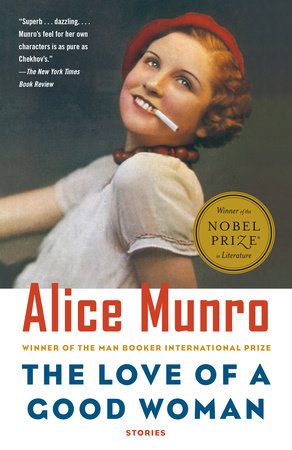The Love of a Good Woman Reader’s Guide
By Alice Munro


1. In the first story, "The Love of a Good Woman," how has the town of Jutland, its way of life and its mores, affected Enid’s character and desires and helped to mold her into the person she is? What does she want from life and what compromises has she made? Does she believe Mrs. Quinn’s tale of murder? If so, does it make Rupert more, or less, attractive to her? What exactly does she want from Rupert?
2. What does the author accomplish by dividing "Jakarta" into two parts–the distant past and the present? In what essential way do the two marriages (Kath and Kent; Sonje and Cottar) differ? How are Kath’s and Sonje’s different attitudes to marriage borne out in the subsequent courses of their lives? Might Sonje’s conviction that Cottar is still alive be true, or is it merely an attempt to hold on to a remnant of her former happiness?
3. In "Cortes Island," why did the narrator and her husband decide to marry, and how does the marriage evolve? Does the author imply that the same evolution occurs in many, or most, marriages? What sort of reflection do the Gorries and their rather grotesque marriage and menage cast upon that of their young lodgers? Why does Mr. Gorrie want the narrator to know about his past? Why is Mr. Gorrie, rather than any other man, featured in the narrator’s erotic dreams? How does the narrator’s sense of self change over the course of her story?
4. In what ways are Eve and Sophie in "Save the Reaper" similar in character, and in what ways are they different? Would you say that Sophie, either consciously or unconsciously, has modeled her life on her mother’s? If so, is the situation changing? Why does Eve, in spite of her obvious fears, give the vagrant girl directions to her house? What might the title of the story (a quotation from Alfred, Lord Tennyson’s poem "The Lady of Shallott") signify?
5. How does Pauline, in "The Children Stay," perceive marriage and family life? Does the author imply that the pretenses and the feeling of imprisonment that Pauline experiences are present, to some degree, in every marriage? Is the "bleakness" Pauline senses in herself and her father-in-law due to their situations, or their characters? Pauline says at the end that Jeffrey was not Orphée. Is she being honest? In what ways does "The Children Stay" echo or parallel the story of Orpheus and Eurydice? What role does the idea of fate play for the various characters?
6. How does Karin in "Rich As Stink" perceive the dynamic between Rosemary, Derek and Ann? How closely does her perception correspond with the reality? Would you agree with Karin that Derek has "given up on" both Rosemary and Ann (p. 236)? How much has Rosemary’s wealth to do with her acceptance by Derek and Ann? Why doesn’t Ann want Derek to see Karin in her wedding dress, and why is Karin determined to wear it to the dinner party? What sort of future do you envision for Rosemary? For Karin?
7. In "Before the Change," what do the narrator’s experiences at home with her father tell her about her relationship with Robin, its illusions, and its unhappy end? Robin differentiates "ideas" and "life"; is he being cynical or simply realistic? How are the narrator’s beliefs about abortion and parenthood affected by her own mother’s death in childbirth, and how are these beliefs modified during the course of the story? How do her ideas about love, too, undergo changes? Might she have made different decisions about her love affair and pregnancy if she had it to do over again?
8. In "My Mother’s Dream," what has the dream, described at the beginning of the story, to do with Jill’s actual life and experiences? Has she known what it is to "leave" a baby? What relation does Jill’s struggle with the baby have to her struggle with George’s family and his memory? Would you say that this mother-child struggle is a universal one, extreme though it is in Jill’s case?
Alice Munro grew up in Wingham, Ontario, and attended the University of Western Ontario. She has published thirteen collections of stories as well as a novel, Lives of Girls and Women, and two volumes of Selected Stories. During her distinguished career she has been the recipient of many awards and prizes, including three of Canada’s Governor General’s Literary Awards and two of its Giller Prizes, the Rea Award for the Short Story, the Lannan Literary Award, England’s W. H. Smith Book Award, the National Book Critics Circle Award, and the Man Booker International Prize. In 2013 she was awarded the Nobel Prize for Literature. Her stories have appeared in The New Yorker, The Atlantic Monthly, The Paris Review, Granta, and other publications, and her collections have been translated into thirteen languages. She lives in Clinton, Ontario, near Lake Huron.
Just for joining you’ll get personalized recommendations on your dashboard daily and features only for members.
Find Out More Join Now Sign In